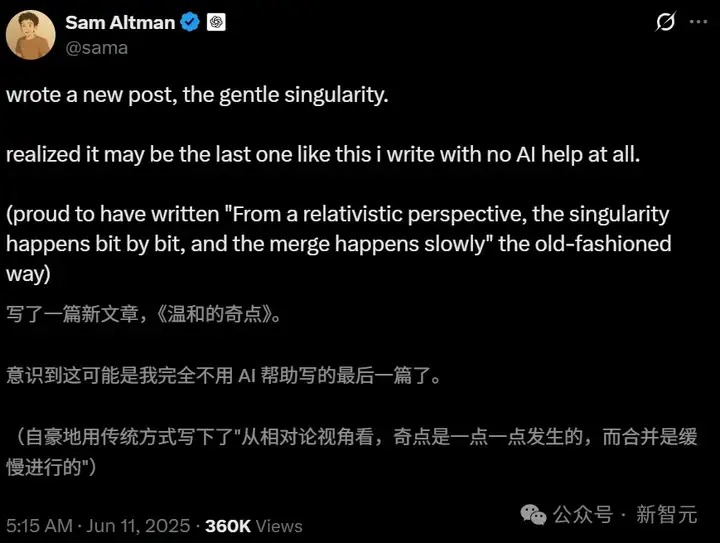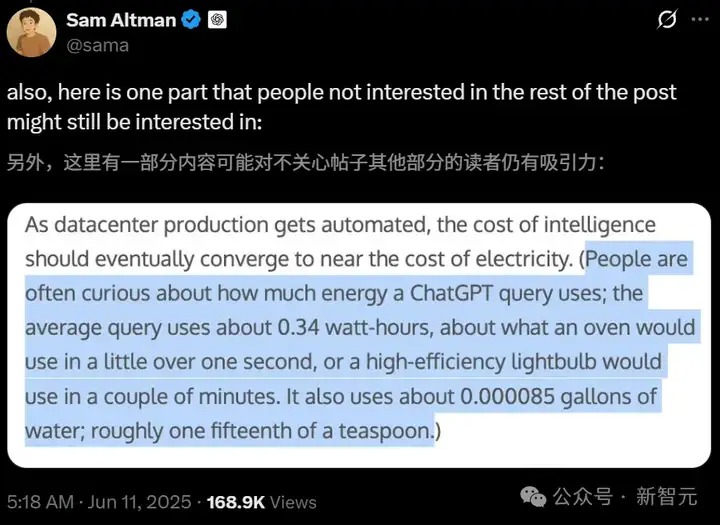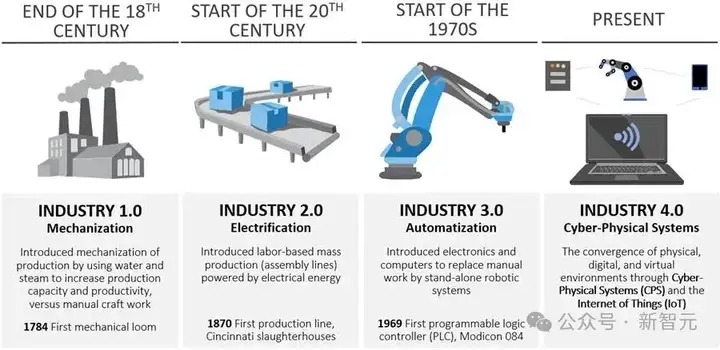May we smoothly, exponentially, and serenely step into the era of superintelligence.
Author: JYH, New Intelligence
Ultraman's handwritten long article "Gentle Singularity" has caused a huge stir in the AI community. He predicts that humanity is moving towards the era of superintelligence, and the singularity will not come overnight, but will quietly permeate.
After the o3-pro event, Ultraman promptly released his latest blog post—Gentle Singularity.
At the beginning of the article, a sense of urgency comes rushing in:
Humanity has crossed the "event horizon" of AI development and entered a phase of exponential acceleration.

Ultraman believes that the singularity will not arrive overnight, but will quietly permeate: wonder becomes the norm, and the norm becomes the baseline.
In the text, he also provided his predictions for the technology timeline over the next five years:
2025: Intelligent agents will be capable of real cognitive work (such as programming), and the way of working will be reshaped;
2026: AI may possess the ability to discover new knowledge;
2027: Robots are expected to perform tasks in the physical world;
2030: Individual productivity will far exceed that of 2020, leading to significant changes in social production methods.
It is worth mentioning that this is Ultraman's last handwritten article, with no AI content at all.

He also pointed out another overlooked aspect, which is the energy consumption of each query to ChatGPT.

ChatGPT consumes about 0.34 watt-hours of electricity per query, roughly equivalent to running an oven for just over a second, or lighting an energy-saving bulb for a few minutes.
Additionally, each query also requires about 0.000085 gallons of water, which is about 1/15 of a teaspoon.
Next, let’s follow Ultraman's perspective to explore the future of AI.
Humanity has crossed the critical point, and it is now
We have crossed the event horizon; the "ascension" has already begun.

In astrophysics, an event that exceeds the event horizon cannot affect external observers.
Humanity is just one step away from building digital superintelligence, but so far, this process has been much smoother than imagined.
Robots are not yet running on every street, and most people do not spend all day talking to AI. We still age, get sick, and die, and we still cannot easily enter space; there are many unsolved mysteries in the universe.
However, we have indeed built intelligent systems that far exceed human capabilities in many areas, which may greatly enhance productivity. Those scientific breakthroughs once thought to be the least likely have been achieved; it is these hard-won insights that have birthed systems like GPT-4 and o3, which will lead us into a further future.
In many ways, AI will contribute to the world.
Among them, AI will drive accelerated scientific progress and improve productivity, bringing a tremendous leap in quality of life. The future will be much better than the present. Scientific advancement is the greatest engine of overall development, and the infinite possibilities of the future are incredibly exciting.
In a significant sense, ChatGPT is more powerful than anyone in history.
Every day, hundreds of millions of people rely on it to handle increasingly important tasks: small new features can have a huge positive impact, while small deviations can cause significant negative repercussions when used by millions.
Five-year timeline, 2030 as the next milestone
By 2025, AI agents capable of real cognitive work will have arrived, permanently changing the way code is written. In 2026, humanity may welcome systems capable of gaining new insights. By 2027, robots capable of performing tasks in the physical world may emerge.
More people will be able to create software and art. But the demand for both will also rise sharply. As long as they embrace new tools, experts are likely to remain far ahead of novices.
In summary, by 2030, individual work efficiency will far exceed that of 2020, leading to astonishing changes, and many will find ways to benefit from it.
In some very important aspects, 2030 may not have earth-shattering differences. People will still care for their families, express creativity, enjoy games, and swim in lakes.
But in other equally important aspects, 2030 may be radically different from any previous era. We do not yet know how much AI can surpass humans, but we are about to find out.
In the 2030s, wisdom and energy—namely creativity and the ability to turn creativity into reality—will become unprecedentedly abundant.
For a long time, these two have been fundamental factors limiting human progress; if we can have abundant wisdom and energy (along with good governance), we could theoretically have everything.
The AI self-reinforcing cycle is accelerating, and the singularity is quietly permeating
We are already living in an incredible digital intelligence era, and after the initial shock, most people have become accustomed to it.
We quickly shifted from marveling at AI's ability to generate beautifully written paragraphs to expecting it to create beautifully written novels; from being amazed at its life-saving medical diagnoses to expecting it to develop cures; from being impressed by its ability to write a small program to expecting it to establish a brand new company.
The development of the singularity is just like this: past miracles become commonplace, then turn into mundane standards.
From scientists, OpenAI has learned that their productivity has increased two to three times compared to before using AI.
Advanced AI is significant, but perhaps nothing is more important than using it to accelerate research on AI itself. We may discover new computational substrates, better algorithms, and other unexpected surprises. If we can complete ten years of research in a year or even a month, the pace of progress will clearly be completely different.
From now on, existing tools will help us gain deeper scientific insights and assist us in creating superior AI systems.
Of course, this is not the same as AI systems autonomously updating their own code, but it is undoubtedly a prototype of recursive self-improvement. Other self-reinforcing loops have also begun to operate.
The enormous economic value creation has initiated a flywheel of accelerated infrastructure expansion to support these increasingly powerful AI systems.
And robots manufacturing other robots is no longer far off, and in a sense, this also includes data centers building other data centers.
If we must use traditional methods to manufacture the first million humanoid robots, but afterward, they can operate the entire supply chain—mining and refining minerals, driving trucks, operating factories, etc.—to produce more robots, which can then build more chip manufacturing facilities, data centers, etc., then the pace of progress will clearly be very different.
As data center production becomes automated, the cost of intelligence should ultimately approach the cost of electricity.
(People often wonder about the energy consumption of each query to ChatGPT: on average, each query consumes about 0.34 watt-hours, equivalent to running an oven for just over a second, or an energy-efficient bulb working for a few minutes. It also consumes about 0.000085 gallons of water, about one-fifteenth of a teaspoon.)
Approaching the AGI endpoint, AI miracles become the norm
Technological progress will continue to accelerate, and humanity will continue to adapt to all changes.
Certainly, there will be growing pains, such as the overall disappearance of jobs in certain industries, but on the other hand, the growth of global wealth will be so rapid that we will be able to seriously discuss new policy ideas that were previously unimaginable.
Perhaps we will not establish an entirely new social contract overnight, but looking back decades later, quantitative changes will eventually lead to qualitative changes.
Learning from history, we will find new goals and new needs, and quickly absorb new tools. Expectations will rise, but capabilities will also improve rapidly, and the quality of life for everyone will become better.

The occupational changes after the Industrial Revolution are a good example.
Humanity will create increasingly beautiful things for each other.
Compared to AI, humans have a long-term, significant, and unique advantage: we inherently care about others and their thoughts and actions, while we are less concerned about machines.
A farmer from a thousand years ago, if he saw the work of many people today, would say it is simply "fake work," believing that modern people are just indulging in games after being well-fed and living in luxury.
People a thousand years from now, when looking at the work of our era, will hopefully also find it very "fake," but there is no doubt that those engaged in it will feel it is extremely important and be very satisfied.
The speed of new miracles emerging is astonishing.
Today, we can hardly imagine what new discoveries will be made by 2035—
Perhaps we just unraveled the mysteries of high-energy physics this year, and next year we will begin space colonization; or perhaps we made significant breakthroughs in materials science this year, and next year we will have true high-bandwidth brain-machine interfaces.
Many people will choose to live as usual, but at least some may decide to "connect."
Looking to the future, all of this seems incredible. But when we are in it, we may feel shocked, yet still be able to cope.
From a relative perspective, the singularity is occurring gradually, and the integration is proceeding slowly.
We are climbing the long curve of exponential technological growth: looking forward, it seems too steep to climb; looking back, it appears flat and unremarkable. But it is always a smooth curve.
(Imagine if someone in 2020 said that by 2025, there would be products close to AGI; it would sound incredibly unbelievable, especially when compared to the real journey of the past five years.)
The road to superintelligent brains is long and arduous
Great opportunities come with severe challenges.
We certainly need to address safety issues from both technological and social perspectives, but given its enormous economic impact, it is also crucial to ensure the widespread adoption of superintelligence.
The best path may be as follows:
First, solve the alignment problem. This means we must be able to strongly guarantee that AI systems will learn and act towards the true goals of humanity's collective long-term pursuits.
The information flow of social media is an example of misaligned AI: the underlying algorithms are extremely good at keeping you refreshing, and they clearly understand your short-term preferences, but they achieve this by exploiting a mechanism in your brain that overrides your long-term preferences.
Then, focus on making superintelligence cheap, accessible, and not overly concentrated in any individual, company, or country.
Society is resilient, creative, and highly adaptable. If we can harness the collective will and wisdom of humanity, then despite making many mistakes and some situations becoming very dire, we will ultimately learn and adapt quickly, maximizing the benefits of this technology while minimizing risks.
It seems crucial to grant users ample freedom within the broad boundaries that society must delineate. The sooner the world begins to discuss these boundaries and define collective alignment, the better.
The entire industry, not just OpenAI, is building a brain for the world.
It will be highly personalized and easy for everyone to use; our only bottleneck will be good ideas.
For a long time, technical personnel in the entrepreneurial circle have always mocked those "idea kings"—they have ideas but need to find a team to realize them. But in Ultraman's view, these people are about to have their moment in the spotlight.
Today, OpenAI plays multiple roles, but its primary identity is that of a superintelligence research company.
The road ahead is long and arduous, but most paths have been illuminated, and the unknown is rapidly dissipating. We feel honored to be able to engage in the work we love.
"Intelligence so cheap that it doesn't need to be measured" is within reach. This may sound crazy, but if we had told you in 2020 that the world would look like it does today, it would probably sound crazier than our current predictions for 2030.
May we smoothly, exponentially, and serenely step into the era of superintelligence.
免责声明:本文章仅代表作者个人观点,不代表本平台的立场和观点。本文章仅供信息分享,不构成对任何人的任何投资建议。用户与作者之间的任何争议,与本平台无关。如网页中刊载的文章或图片涉及侵权,请提供相关的权利证明和身份证明发送邮件到support@aicoin.com,本平台相关工作人员将会进行核查。




